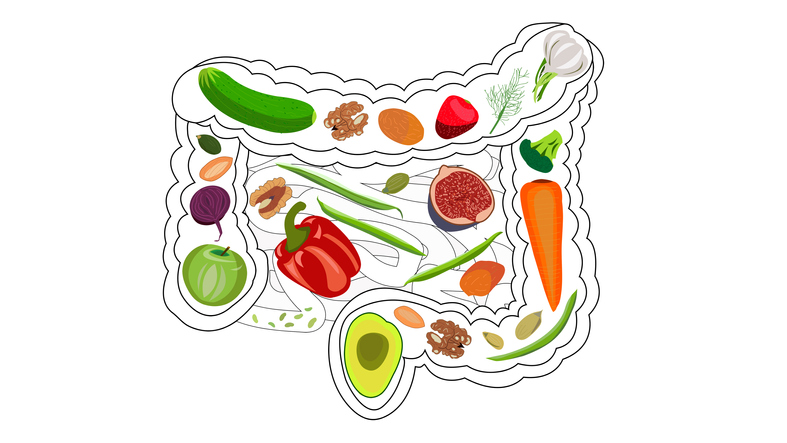There is growing interest in the human body’s microbiome and its connection to chronic disease. A new study examines that connection, along with how the foods we eat influence the composition of our microbiome.
Microbiome protects host and plays role in disease risk
The microbiome consists of the genes of tiny organisms (bacteria, viruses, and other microbes) found in the gastrointestinal tract, primarily in the small and large intestine. The normal gut flora — another term for the microbiome — protects its human host. For the microbiome to flourish, the right balance must exist, with the healthy species dominating the less healthy.
Scientists do not fully understand how the microbiome factors into the risk of developing chronic diseases, such as heart disease, obesity, and type 2 diabetes. Many factors, including differences between individuals and individual diets, have made this a difficult area to investigate.
Study investigates relationships between diet, microbiome, and disease risk
But a new study, published in Nature Medicine, accounts for these factors and sheds light on how our diets shape our microbiome and how our microbiome, in turn, influences our disease risk.
The researchers studied more than 1,100 individuals enrolled in PREDICT 1, a large trial looking at individual responses to food. They used a technique called metagenomic sequencing to identify, classify, measure, and analyze genetic material from the study participants’ microbiomes. They also collected detailed, long-term dietary intake information from all of these individuals, so they could analyze their dietary patterns, including their intake of different food groups, foods, and nutrients. In addition, they collected information from the study participants on a variety of factors that are known to influence metabolism and disease risk, including pre- and post-meal measures of blood sugar (glucose), cholesterol, and inflammation. Finally, they measured personal health attributes of the study participants, including age, weight, body mass index (BMI), body fat, and blood pressure.
Diet influences microbiome and microbiome influences disease risk
The study found that the health of the microbiome is influenced by diet, and that the composition of the microbiome influences the risk of health outcomes. The results showed that specific gut microbes were associated with specific nutrients, foods, food groups, and overall diet composition. Health conditions such as heart disease, type 2 diabetes, obesity, and general inflammation appeared to be most impacted by diet-influenced changes to the microbiome.
For example, less healthy dietary patterns (dairy desserts, unhealthy meats, processed foods) supported gut species that were associated with measures of blood sugar, cholesterol, and inflammation that are significantly associated with higher risk of cardiac events, strokes, and type 2 diabetes.
In contrast, a more diverse gut microbiome was tied to healthy dietary patterns (high-fiber vegetables like spinach and broccoli, nuts, and, heathy animal foods such as fish and eggs) and was linked to measurements tied to lower risk of certain chronic diseases. In addition, the study found that polyunsaturated fats (found in fish, walnuts, pumpkin, flax and chia seeds, sunflower, safflower, and unhydrogenated soybean oils) produce healthy gut species linked to a reduced risk of chronic disease.
Minimally processed, plant-based diet is good for the microbiome and for reducing disease risk
So what do these findings mean for us? First, the study showed that eating more unprocessed plant foods — fruits, vegetables, nuts, seeds, and whole grains — allows the gut microbiome to thrive. Some animal foods, such as fish and eggs, are also favorable. Avoiding certain animal foods, such as red meat and bacon, dairy foods, and highly processed foods (even processed plant foods such as sauces, baked beans, juices, or sugar-sweetened drinks and desserts) prevents less-healthy gut species from colonizing the gut.
It is important to note that food quality matters; processed or ultra-processed plant-based foods were not associated with heathy clusters of gut microbes. When choosing foods, consider whether they are processed or unprocessed, in addition to whether they are a plant or animal food.
It can also be helpful to think in terms of dietary patterns, rather than individual foods or food groups. Meal patterns that emphasize foods beneficial to the microbiome are the whole-food, plant-based dietary patterns. These include vegan (no animal products) and ovo-vegetarian (vegetarian plus eggs) diets. The pescatarian eating pattern, in which oily and white fish are the meats of choice, is also good for the microbiome.
Emphasizing minimally processed plant foods allows the gut microbiome to thrive, providing protection against, or decreasing the risk of, chronic diseases such as heart disease, diabetes, metabolic disease, and obesity.
The post Diet, disease, and the microbiome appeared first on Harvard Health Blog.
, A healthy microbiome — the genes of tiny organisms living in the digestive tract — helps protect its human host from chronic diseases. Researchers do not yet fully understand the connection, but it appears that eating unprocessed plant-based foods allows the gut microbiome to thrive.
The post Diet, disease, and the microbiome appeared first on Harvard Health Blog., Read More

